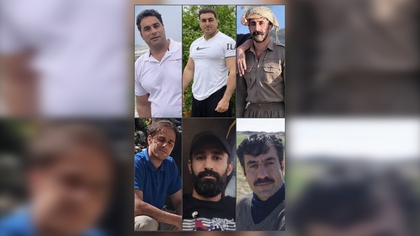Widespread Arrest of Internet Activists in Iran
15:25 - 29 June 2012

KURDPA: Some reports indicate that a new round of arrests of youth and Internet activists has begun. Reports indicate that the interrogators and Intelligence officers, for reasons unknown, have desperately tried to keep these arrests from being publicized.
A new wave of arrests started about a month ago. It appears to have spread to many cities and provinces and has not spared the youth in many provinces in our country.
It should be noted that all of these arrests have taken place under charges such as Internet activity, or charges of blasphemy in cyberspace.
The families of the people arrested are under intense pressure not to publicize these arrests.
The majority of people arrested under this new wave of arrests are incarcerated in the IRGC’s high security ward in Evin prison.
These arrests began on May 23, 2012, and so far, twenty people have been arrested from various provinces under these charges.
Many of these people were first detained for days in their city where they were arrested before being transferred to Evin prison in Tehran.
According to reports, families of these detainees are constantly threatened by the interrogators not to publicize these arrests. The families are told “Alerting the media will cause further problems for your children.”
Some parents have even been threatened that if they alert the media about their children’s arrest, charges of immoral acts will be brought on their children.
Also, it’s been reported that these detainees are under pressure by the interrogators to reveal names of their friends who are active online.
In the meanwhile, families and those close to these detainees suspect that this might be a new project by the anonymous group called the Cyber Army utilized to charge and arrest the youths that are active online.
Although rumors of such a group becoming active started in 2006, it was a few months after the 2009 presidential election, and in response to the widespread protests, and online activities in organizing those protests, that they (the Cyber Army) entered the scene with the same name and attempted to hack the opposition sites, clearly facilitated by the government’s telecommunications and intelligence apparatuses.
Although the association of the group known as the Cyber Army with IRGC’s center to combat cyber crimes still is not clear, and/or with a group in the Intelligence Ministry similarly tasked.
But so far, there has been many rumors floating around regarding this matter, to the point that in 2009, the “Defense Tech” company which is a military and security institution in the United States, claimed that the Cyber Army’s budget in 2009 was 78 Million dollars and their forces were about 2400 people with an estimated 120,000 reserves.
While some believe that the Cyber Army does not even exist and think IRGC and the Intelligence Ministry forces use this name to cover their secret activities in cyberspace and misuse of government facilities for the suppression and subjugation of the opposition.
Email monitoring and control, and communications of cyberspace activists are tasks that have been attributed to this group.
However, except in a few cases so far, mainly due to technical problems of the operating sites, they have been only been able to hack few sites. No other particular activities in the Cyberspace have been detected from this group.
Most of the people arrested in the past three years, have said that most of the information from emails and their exchanges in cyberspace used in investigations against those individuals was not a result of the work of the intelligence apparatus but was derived by the interrogating team obtaining passwords of the individuals, by reading their emails and also by interrogation of other detainees.
In many cases, the detainees have indicated that prior to giving their passwords to the interrogators, the interrogating team did not have any special information from the contents of their emails.
In the fall and winter of 2010, IRGC launched a project to arrest the more well known online activists. The detention periods for these people were short. And according to the detainees, allegations centered around their activities in cyberspace, especially in the social network Facebook.
During the interrogations of these detainees, the interrogators claimed that they had been identified by the Cyber Army specifically through their Facebook posts and comments.
At that juncture and after their release, the people arrested said they were aware of printouts of their Facebook entries in their case files and charges were brought up based on those entries. However, many of these printouts were from the public posts of these people.
It is said that the government’s intelligence agents that are active online, in addition to trying to hack the Green sites, work hard to spread computer viruses and put activists and critics under cyber attack.
The recent attempts to track people using their online activities as an excuse to arrest people can also be attributed to the activities of this group.
A new wave of arrests started about a month ago. It appears to have spread to many cities and provinces and has not spared the youth in many provinces in our country.
It should be noted that all of these arrests have taken place under charges such as Internet activity, or charges of blasphemy in cyberspace.
The families of the people arrested are under intense pressure not to publicize these arrests.
The majority of people arrested under this new wave of arrests are incarcerated in the IRGC’s high security ward in Evin prison.
These arrests began on May 23, 2012, and so far, twenty people have been arrested from various provinces under these charges.
Many of these people were first detained for days in their city where they were arrested before being transferred to Evin prison in Tehran.
According to reports, families of these detainees are constantly threatened by the interrogators not to publicize these arrests. The families are told “Alerting the media will cause further problems for your children.”
Some parents have even been threatened that if they alert the media about their children’s arrest, charges of immoral acts will be brought on their children.
Also, it’s been reported that these detainees are under pressure by the interrogators to reveal names of their friends who are active online.
In the meanwhile, families and those close to these detainees suspect that this might be a new project by the anonymous group called the Cyber Army utilized to charge and arrest the youths that are active online.
Although rumors of such a group becoming active started in 2006, it was a few months after the 2009 presidential election, and in response to the widespread protests, and online activities in organizing those protests, that they (the Cyber Army) entered the scene with the same name and attempted to hack the opposition sites, clearly facilitated by the government’s telecommunications and intelligence apparatuses.
Although the association of the group known as the Cyber Army with IRGC’s center to combat cyber crimes still is not clear, and/or with a group in the Intelligence Ministry similarly tasked.
But so far, there has been many rumors floating around regarding this matter, to the point that in 2009, the “Defense Tech” company which is a military and security institution in the United States, claimed that the Cyber Army’s budget in 2009 was 78 Million dollars and their forces were about 2400 people with an estimated 120,000 reserves.
While some believe that the Cyber Army does not even exist and think IRGC and the Intelligence Ministry forces use this name to cover their secret activities in cyberspace and misuse of government facilities for the suppression and subjugation of the opposition.
Email monitoring and control, and communications of cyberspace activists are tasks that have been attributed to this group.
However, except in a few cases so far, mainly due to technical problems of the operating sites, they have been only been able to hack few sites. No other particular activities in the Cyberspace have been detected from this group.
Most of the people arrested in the past three years, have said that most of the information from emails and their exchanges in cyberspace used in investigations against those individuals was not a result of the work of the intelligence apparatus but was derived by the interrogating team obtaining passwords of the individuals, by reading their emails and also by interrogation of other detainees.
In many cases, the detainees have indicated that prior to giving their passwords to the interrogators, the interrogating team did not have any special information from the contents of their emails.
In the fall and winter of 2010, IRGC launched a project to arrest the more well known online activists. The detention periods for these people were short. And according to the detainees, allegations centered around their activities in cyberspace, especially in the social network Facebook.
During the interrogations of these detainees, the interrogators claimed that they had been identified by the Cyber Army specifically through their Facebook posts and comments.
At that juncture and after their release, the people arrested said they were aware of printouts of their Facebook entries in their case files and charges were brought up based on those entries. However, many of these printouts were from the public posts of these people.
It is said that the government’s intelligence agents that are active online, in addition to trying to hack the Green sites, work hard to spread computer viruses and put activists and critics under cyber attack.
The recent attempts to track people using their online activities as an excuse to arrest people can also be attributed to the activities of this group.



